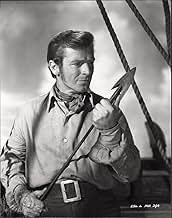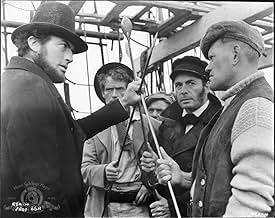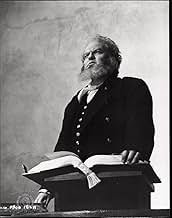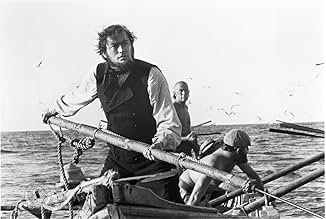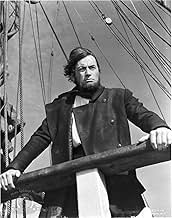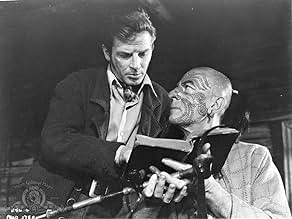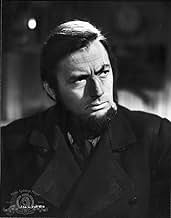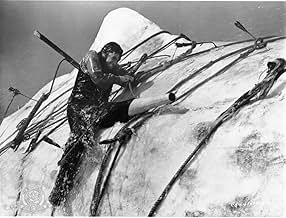IMDb-BEWERTUNG
7,3/10
23.240
IHRE BEWERTUNG
Der einzige Überlebende eines gesunkenen Walfangschiffs erzählt die Geschichte der selbstzerstörerischen Besessenheit seines Kapitäns, den weißen Wal Moby Dick zu erlegen.Der einzige Überlebende eines gesunkenen Walfangschiffs erzählt die Geschichte der selbstzerstörerischen Besessenheit seines Kapitäns, den weißen Wal Moby Dick zu erlegen.Der einzige Überlebende eines gesunkenen Walfangschiffs erzählt die Geschichte der selbstzerstörerischen Besessenheit seines Kapitäns, den weißen Wal Moby Dick zu erlegen.
- Auszeichnungen
- 5 Gewinne & 4 Nominierungen insgesamt
Friedrich von Ledebur
- Queequeg
- (as Friedrich Ledebur)
Tamba Allen
- Pip
- (Nicht genannt)
Empfohlene Bewertungen
It would be impossible to make a movie that came up to the standard of the novel "Moby-Dick", but this film does a fine job of capturing some of the most important themes, and of telling a selection of the key parts of the story in an interesting way. It would be a temptation for any film-maker to put the focus on the action and the special effects, and thus ruin the heart of the book by downplaying its themes, as so many recent films have done with other classic material. Instead, John Huston's version concentrates on bringing out many of the complex internal and external conflicts of Captain Ahab, in sketching the crew members and their reactions to Ahab's monomania, and in portraying the atmosphere of frequent tedium, growing tension, and occasional dread aboard the 'Pequod'.
Richard Basehart's mild, pleasant demeanor makes Ishmael an appropriate mirror for the events and characters on the ship. Gregory Peck does rather well in the very challenging role of Ahab. Ahab is one of the most carefully-designed and demanding characters in literature, and lesser actors would simply be an embarrassment in the part. On screen, there is much to Ahab that just does not come across, and Peck's performance has to be judged with that in mind.
Leo Genn makes his scenes as Starbuck count, and several of the other crew members are portrayed well, albeit in much smaller parts. As Father Mapple, Orson Welles has only one scene, but it is an important one, in that it sets up some of the vital themes of the story ahead. Welles was an ideal choice, and his scene in the church is one scene that does come up to the high standard of Melville's novel.
While there may indeed be some areas in which this version falls short, and it's fair to point them out, it would be pretty difficult to improve on it in a cinema version of the story. And if taken on its own, it fits together well, making generally good choices as to what material would fit together and would work on screen, and in using the photography and settings to create the right atmosphere. For those who appreciate the depth of the original story, this has more than enough to make it worth watching.
Richard Basehart's mild, pleasant demeanor makes Ishmael an appropriate mirror for the events and characters on the ship. Gregory Peck does rather well in the very challenging role of Ahab. Ahab is one of the most carefully-designed and demanding characters in literature, and lesser actors would simply be an embarrassment in the part. On screen, there is much to Ahab that just does not come across, and Peck's performance has to be judged with that in mind.
Leo Genn makes his scenes as Starbuck count, and several of the other crew members are portrayed well, albeit in much smaller parts. As Father Mapple, Orson Welles has only one scene, but it is an important one, in that it sets up some of the vital themes of the story ahead. Welles was an ideal choice, and his scene in the church is one scene that does come up to the high standard of Melville's novel.
While there may indeed be some areas in which this version falls short, and it's fair to point them out, it would be pretty difficult to improve on it in a cinema version of the story. And if taken on its own, it fits together well, making generally good choices as to what material would fit together and would work on screen, and in using the photography and settings to create the right atmosphere. For those who appreciate the depth of the original story, this has more than enough to make it worth watching.
This is a film that becomes part of you. I used to watch it over and over again on TV when it was shown during my childhood in the 1960's, and I never tire of watching it. And whenever I find myself living somewhere away from the ocean, the longing is intense to find water again. "Call me Ishmael".
The screenplay was written by Ray Bradbury, and it was his first. In his lectures and interviews, Bradbury always seems to tell the story of how John Huston contacted him out of the blue for this assignment. Evidently, he flew Bradbury and his wife to Ireland, where the science fiction writer was holed up in a hotel for a few weeks, in a wonderful agony of creation.
Bradbury has always been enamoured with classic novels. His book "Fahrenheit 451" told us how great literature somehow becomes subversive, in a controlled society. Under fascism, individuals are not encouraged to understand what it is to be truly human. Life becomes flat, and it is a deliberate process.
Before I had a VCR, I taped this movie on an audio cassette. It was an amazing experience to see it unfold in my mind's eye.
Bradbury put his whole heart into this screenplay, and the result can never be matched.
The screenplay was written by Ray Bradbury, and it was his first. In his lectures and interviews, Bradbury always seems to tell the story of how John Huston contacted him out of the blue for this assignment. Evidently, he flew Bradbury and his wife to Ireland, where the science fiction writer was holed up in a hotel for a few weeks, in a wonderful agony of creation.
Bradbury has always been enamoured with classic novels. His book "Fahrenheit 451" told us how great literature somehow becomes subversive, in a controlled society. Under fascism, individuals are not encouraged to understand what it is to be truly human. Life becomes flat, and it is a deliberate process.
Before I had a VCR, I taped this movie on an audio cassette. It was an amazing experience to see it unfold in my mind's eye.
Bradbury put his whole heart into this screenplay, and the result can never be matched.
"We are all killers, on land and on sea," wrote Herman Melville more than 100 years ago. But the artistic failure of a recent television adaptation of his greatest work shows that some are killers, too, on screen. Movie makers. Butchers. Their guts are now gorged with Moby Dick.
"Majestic" raved "TV Guide" about USA Network's production of Melville's book. Reading that review I had a fantasy where Captain Ahab, with his sublime limp, walks into the magazine's office, shoves director John Huston's 1956 film of Moby Dick into the VCR, points to the screen and defiantly exclaims:
"There's majesty for you . . . "
. . . in the faces of men. Huston's film benefits from its intelligent casting of the seamen. The actors in the recent production are just pretty-boy imports from Los Angeles, rabble-rousers lacking the dignity that is gained from a lifetime of duty. But that dignity is plainly visible on the rugged faces of the men in the earlier film. One rarely sees that anymore.
. . . in the faces of women, too. The images of the women suffering as they watch their men go off to sea are utterly devastating, they hold so much emotional depth, so much beauty. The attention to detail in Huston's film is striking: the hairs on the chins of the old women, the tired, thick-skinned expressions of the wives and widows, the heavy shawls covering their heads.
. . . in the performances. Over 40 years ago when Orson Welles gave his performance as Father Mapple (a role which only a person with a special kind of magnificence could successfully take on), Gregory Peck might have been busily preparing for his role as Captain Ahab in the same film. What a testament to Peck's stature as one of our leading actors that throughout his career he could play not only Captain Ahab but also, in the recent production, Father Mapple.
. . . in the color. Huston's film is in Technicolor, a technique which produced colors not even seen in nature. The sky is now blue now red now green. The water is brown, pink, gray. Colors blend. Colors clash. By comparison, how banal the colors of our post-Technicolor world!
. . . in the mouth. The seamen have the exquisite mouths of pipe-smokers. The upper lip tight and stiff after so many hours pulled down in the puff.
. . . in the eyes. My favorite scene is where Peck as Captain Ahab famously proclaims: "Speak not to me of blasphemy. I'd strike the sun if it insulted me." The lighting, the acting, everything here is superb. The camera is focused tightly on Peck's face. The stark appearance of his eyes -- the tense, black irises all surrounded by gleaming white -- seems to reveal the subtext of the story. His eyes electrify!
John Huston's film says more in its two hours than USA Network's says in four; it suggests a lot and explains little, whereas the latter tries to explain a lot but says nothing. A great film, it doesn't butcher Melville's Moby Dick but adds to its power.
"Majestic" raved "TV Guide" about USA Network's production of Melville's book. Reading that review I had a fantasy where Captain Ahab, with his sublime limp, walks into the magazine's office, shoves director John Huston's 1956 film of Moby Dick into the VCR, points to the screen and defiantly exclaims:
"There's majesty for you . . . "
. . . in the faces of men. Huston's film benefits from its intelligent casting of the seamen. The actors in the recent production are just pretty-boy imports from Los Angeles, rabble-rousers lacking the dignity that is gained from a lifetime of duty. But that dignity is plainly visible on the rugged faces of the men in the earlier film. One rarely sees that anymore.
. . . in the faces of women, too. The images of the women suffering as they watch their men go off to sea are utterly devastating, they hold so much emotional depth, so much beauty. The attention to detail in Huston's film is striking: the hairs on the chins of the old women, the tired, thick-skinned expressions of the wives and widows, the heavy shawls covering their heads.
. . . in the performances. Over 40 years ago when Orson Welles gave his performance as Father Mapple (a role which only a person with a special kind of magnificence could successfully take on), Gregory Peck might have been busily preparing for his role as Captain Ahab in the same film. What a testament to Peck's stature as one of our leading actors that throughout his career he could play not only Captain Ahab but also, in the recent production, Father Mapple.
. . . in the color. Huston's film is in Technicolor, a technique which produced colors not even seen in nature. The sky is now blue now red now green. The water is brown, pink, gray. Colors blend. Colors clash. By comparison, how banal the colors of our post-Technicolor world!
. . . in the mouth. The seamen have the exquisite mouths of pipe-smokers. The upper lip tight and stiff after so many hours pulled down in the puff.
. . . in the eyes. My favorite scene is where Peck as Captain Ahab famously proclaims: "Speak not to me of blasphemy. I'd strike the sun if it insulted me." The lighting, the acting, everything here is superb. The camera is focused tightly on Peck's face. The stark appearance of his eyes -- the tense, black irises all surrounded by gleaming white -- seems to reveal the subtext of the story. His eyes electrify!
John Huston's film says more in its two hours than USA Network's says in four; it suggests a lot and explains little, whereas the latter tries to explain a lot but says nothing. A great film, it doesn't butcher Melville's Moby Dick but adds to its power.
This version of the Melville classic should, without question, be regarded as the penultimate screen adaptation of a masterwork of American fiction. Everything - absolutely everything - about this film works, from John Huston's brilliant direction, to the screenplay ( co-written by Ray Bradbury ), to the powerful and believable performances. Gregory Peck IS Ahab; if anyone defined and crystallized so megalomaniacal a character, it was Peck, hands down. Not that this should be interpreted as a slight to any of the supporting cast; it isn't. The casting is so good, in fact, that now we find it difficult, if not impossible, to view the supporting cast members in any other light, especially Frederich Ledebur: his choice by the producers as Queequeg was nothing if not dead on the money, as was the small but significant part of Elizah, as portrayed by Royal Dano. Granted, some liberties were taken with the book ( so what else is new? ), such as the squid being written out completely, but this was, and continues to be, necessary in order to make a movie that doesn't take five hours to play out. Yes, okay, it's a "Cliff's Notes" "Moby Dick", but if what you're after is good direction, outstanding ( one could say tour de force ) acting, and a tight screenplay, then this is the movie for you. Believe us, this is the one, NOT the remake with Patrick Stewart. Stewart's Ahab is basically Patrick Stewart playing Patrick Stewart playing Ahab or, to put it another way, Huston's "Moby Dick" needs to be remade about as badly as the rest of us need leukemia. 'Nuff said.
I red Herman Melville's book "Moby Dick" some years ago and though the story was really captivating and I enjoyed it very much but somehow it seemed too long to me. This film version by John Houston lasts a couple of hours and I think it works very good as a resume of Captain Ahab's revengeful chase of the white whale. Don't get me wrong: the book is a classic and a very good one too but it is movies we're talking about here.
"Moby Dick" is a real good adventure film and Houston's direction is pretty accurate. He delivers the plot slowly but constantly up to the moment we are all waiting for: the appearance of the whale ("huge as mountain of snow"). In the meantime he shows the different characters on board the "Pequod" such as the professional Mr. Starbuck, the second in command; the tough and at he same time friendly Mr. Stubb; the mysterious Queequegg with his body covered by tattoos; and Ishmael the newcomer in search for adventure.
But the center of the whole thing is Captain Ahab with his leg ripped of by the white whale and living with the only purpose of taking revenge of the beast. Nothing else matters for him. And so obsessed Ahab is that he finally passes his madness into his men too.
Gregory Peck brings a fine performance as the tortured and insane Captain and he shows perfectly he has been a dead man long before his meeting at sea with Moby Dick. Leo Genn is good too as well as Harry Andrews as Stubb (I can't recall a bad performance from Andrews in all his many appearances as a supporting actor). Richard Basehart is correct in the role of Ishmael, though perhaps his acting is a little too light here.
The final battle between the men and the white whale is outstanding or even more if you consider it was made with the special effects of the 50's. Huston shows his skill here too.
Watch this film if you missed it (don't go for that recent too long all computer TV version starring Patrick Stewart as Ahab); you'll sure enjoy it if you like high classic adventure with psychology in the characters too.
"Moby Dick" is a real good adventure film and Houston's direction is pretty accurate. He delivers the plot slowly but constantly up to the moment we are all waiting for: the appearance of the whale ("huge as mountain of snow"). In the meantime he shows the different characters on board the "Pequod" such as the professional Mr. Starbuck, the second in command; the tough and at he same time friendly Mr. Stubb; the mysterious Queequegg with his body covered by tattoos; and Ishmael the newcomer in search for adventure.
But the center of the whole thing is Captain Ahab with his leg ripped of by the white whale and living with the only purpose of taking revenge of the beast. Nothing else matters for him. And so obsessed Ahab is that he finally passes his madness into his men too.
Gregory Peck brings a fine performance as the tortured and insane Captain and he shows perfectly he has been a dead man long before his meeting at sea with Moby Dick. Leo Genn is good too as well as Harry Andrews as Stubb (I can't recall a bad performance from Andrews in all his many appearances as a supporting actor). Richard Basehart is correct in the role of Ishmael, though perhaps his acting is a little too light here.
The final battle between the men and the white whale is outstanding or even more if you consider it was made with the special effects of the 50's. Huston shows his skill here too.
Watch this film if you missed it (don't go for that recent too long all computer TV version starring Patrick Stewart as Ahab); you'll sure enjoy it if you like high classic adventure with psychology in the characters too.
Wusstest du schon
- WissenswertesGregory Peck initially blamed the poor reviews of his performance on the script, which he felt contained "too much prose from the novel". However, he later acknowledged that he had been too young for the part at 38, since Captain Ahab was supposed to be an old man at the end of his career (Ahab's age, as implied in the book's chapter "The Symphony", is 58). He added, "The film required more. At the time, I didn't have more in me." and apologized to the screenwriters. Director John Huston admitted he didn't want Peck as Ahab, but had spoken very highly of him & was very satisfied with his performance.
- PatzerThe way the ship was moved away from the pier was incorrect. The crew is shown hauling a line from the pier. This would not make the ship move forward. To move a ship out of the harbor, it is therefore, necessary to provide something to pull against. A special anchor, called a kedging anchor, is carried as far from the ship as possible by the longboat and then dropped to the seabed. The remaining crew pull the ship out to it winding the line around the capstan or winch, and then it is hauled up and the process repeated as many times as necessary.
- Zitate
Captain Ahab: From hell's heart I stab at thee; for hate's sake I spit my last breath at thee. Ye damned whale.
- Crazy CreditsThe film finishes with 'Finis' instead of the usual 'The End'.
- VerbindungenEdited into De 7 Dødssyndene: Latskap (2007)
Top-Auswahl
Melde dich zum Bewerten an und greife auf die Watchlist für personalisierte Empfehlungen zu.
Details
- Erscheinungsdatum
- Herkunftsland
- Sprache
- Auch bekannt als
- Herman Melville's Moby Dick
- Drehorte
- Youghal, County Cork, Irland(harbour: New Bedford - departure of The Pequod)
- Produktionsfirma
- Weitere beteiligte Unternehmen bei IMDbPro anzeigen
Box Office
- Budget
- 4.500.000 $ (geschätzt)
- Weltweiter Bruttoertrag
- 353 $
- Laufzeit1 Stunde 56 Minuten
- Seitenverhältnis
- 1.66 : 1
Zu dieser Seite beitragen
Bearbeitung vorschlagen oder fehlenden Inhalt hinzufügen



